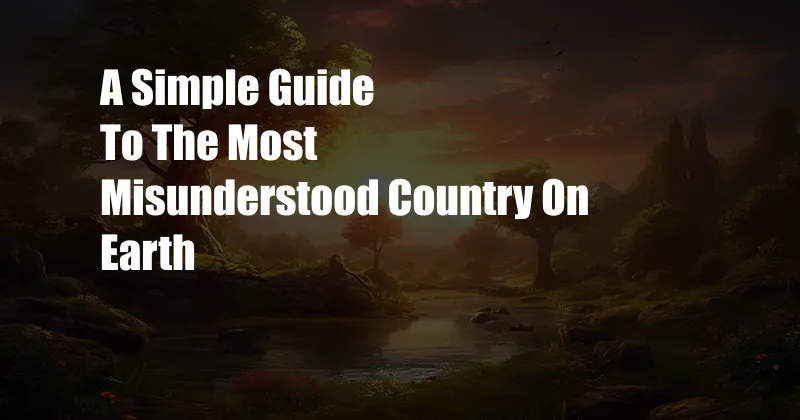
A Simple Guide to the Most Misunderstood Country on Earth
As I strolled through the bustling streets of Tehran, I couldn’t help but notice the warmth and hospitality of the locals, starkly contrasting with the negative stereotypes I had long held about Iran. My preconceptions, shaped by years of Western media coverage, had depicted a country shrouded in mystery, hostility, and religious extremism. However, my firsthand experience shattered those misconceptions, revealing a vibrant and welcoming nation with a rich history and culture.
In the heart of the Middle East, Iran stands as a perplexing enigma, often shrouded in misinterpretations and preconceived notions. Western media portrays a distorted narrative, perpetuating stereotypes based on political agendas and geopolitical conflicts, obscuring the true essence of this enigmatic land.
Iran: A Rich Tapestry of History and Culture
Iran’s history stretches back millennia, its ancient civilization leaving an indelible mark on the world. From the grand Empire of Persia under Cyrus the Great to the Islamic Golden Age, Iran has been a cradle of innovation, scholarship, and artistic expression. Its rich cultural heritage encompasses diverse ethnicities and languages, reflecting the mosaic of civilizations that have graced its soil.
In the 20th century, Iran underwent significant social and political transformations. The 1979 Iranian Revolution ushered in a new era, marked by both challenges and triumphs. Despite Western media portraying the country solely through the lens of geopolitical strife, Iran has made significant strides in education, healthcare, and economic development, showcasing a resilience and determination often overlooked.
Comprehending Iran’s Complexities
To truly understand Iran, it is crucial to delve deeper beneath the surface. Beyond the headlines and sound bites, a nuanced perspective is needed, one that acknowledges the country’s complexities and contradictions. Iran is a nation grappling with its past and embracing modernity, simultaneously rooted in tradition and aspiring towards progress.
The Iranian people are inherently diverse, their beliefs and aspirations spanning a wide spectrum. While religion plays a significant role in society, there is a remarkable diversity of thought and expression. From the devout to the secular, Iranians engage in spirited debates, reflecting the richness and complexity of their society.
Iran’s Role in the International Arena
Iran’s position in the international community is often fraught with complexities and challenges. Western foreign policy towards Iran has been marred by mistrust and geopolitical tensions. However, Iran remains a key player in the region, with a strategic location and a population of over 80 million people.
Iran’s nuclear program has been a focal point of international concern, but recent diplomatic efforts have yielded progress. The Joint Comprehensive Plan of Action (JCPOA) aimed to curb Iran’s nuclear ambitions in exchange for sanctions relief. While the future of the JCPOA remains uncertain, it reflects a willingness to engage in dialogue and reduce tensions.
Expert Insights and Tips for Understanding Iran
To gain a deeper understanding of Iran’s multifaceted nature, it is invaluable to seek expert insights and perspectives. Renowned scholars, journalists, and diplomats have dedicated their lives to studying and analyzing Iran, offering valuable insights into its history, culture, and contemporary affairs.
Eminent historian Ervand Abrahamian, in his seminal work “A History of Modern Iran,” provides a comprehensive account of Iran’s transformation from the 19th century to the present day. Award-winning journalist Dexter Filkins, in his book “The Forever War,” delves into the complexities of Iran-US relations and the impact of war and occupation in the Middle East.
FAQs on Iran: Unraveling Common Misconceptions
Q: Is Iran a dangerous country for tourists?
A: Overall, Iran is a safe destination for tourists. The Iranian people are known for their hospitality, and the country has a relatively low crime rate. However, it is always advisable to exercise caution, especially in crowded areas.
Q: What is the role of religion in Iranian society?
A: Islam plays a significant role in Iranian society and culture. The majority of Iranians identify as Muslim, and Islamic principles influence laws, customs, and social practices. However, there is a diversity of religious beliefs and practices, and non-Muslim minorities are also present.
Conclusion
Iran, a nation steeped in history and adorned with cultural richness, continues to face misconceptions and misunderstandings in the eyes of the world. To truly fathom the essence of this enigmatic land, it is imperative to venture beyond superficial portrayals and delve into the complexities that define it.
Embracing a nuanced understanding, seeking expert insights, and engaging in meaningful dialogue are crucial steps towards unraveling the misconceptions surrounding Iran. Only then can we appreciate the true beauty and spirit of this enduring nation and foster bridges of understanding and cooperation.